Three international organizations just released the Anti-Corruption Ethics and Compliance Handbook for Business. The three organizations include the Organisation for Economic Co-operation and Development (OECD), The United Nations Office on Drugs and Crime (UNODC) and the World Bank. Hereinafter is the self-explanatory message from the OECD, the UNODC and the World Bank.
Message from the OECD, UNODC and World Bank
The idea for this handbook began with G20 governments looking for ways to practically implement the 2010 G20 Anti-Corruption Action Plan. This Plan recognises the integral role the private sector plays in the fight against corruption and calls for greater public-private partnership in this effort. Since the adoption of the Plan, G20 governments and their private-sector counterparts have met on a number of occasions to look at ways to build this partnership.
One of the suggestions that has come out of the discussions has been companies’ observation that the myriad of existing anti-corruption principles for business can be confusing, especially for small and medium-sized enterprises with limited resources, which are looking for concrete ways to prevent corruption in their business dealings in an increasingly complex and globalised operating environment.
To address this challenge, this handbook has been developed by companies, for companies, with assistance from the Organisation for Economic Co-operation and Development (OECD), the United Nations Office on Drugs and Crime (UNODC), and the World Bank. Our three organisations only facilitated the work of private-sector organisations, which have volunteered their expertise and time with us. These organisations include: representatives from the accounting and auditing profession, the Basel Institute on Governance, the Business and Industry Advisory Committee to the OECD (BIAC), the International Bar Association (IBA), the International Chamber of Commerce (ICC), the World Economic Forum Partnering Against Corruption Initiative (PACI), Transparency International (TI), and the UN Global Compact.
The handbook is not intended to create new standards or represent any form of legally binding requirement for businesses. It has been developed to serve as a useful, practical tool for companies seeking compliance advice in one, easy-to-reference publication.
The handbook is divided into three sections. The first section provides an overview of the international anti-corruption framework, within which companies conducting international business must operate. The second section provides a brief introduction to how companies can assess their risk in order to begin developing an effective anti-corruption ethics and compliance programme. The third and most significant section brings together the major business guidance instruments. A comparison of these instruments reveals that they all largely include the same basic anti-corruption ethics and compliance elements. These elements are further illustrated using real-life, anonymised case studies provided by companies. Finally, the handbook includes as an annex a quick-reference table providing a cross-comparison of all the major business guidance instruments referenced in this handbook.
The OECD, the UNODC, and the World Bank hope this handbook will be a useful resource not only for companies headquartered in G20 countries, but for all companies that recognise the need for developing and implementing robust anti-corruption ethics and compliance programmes.
You may follow the link for the handbook.






